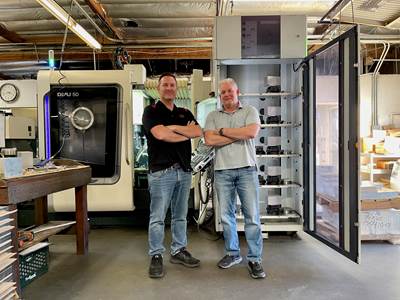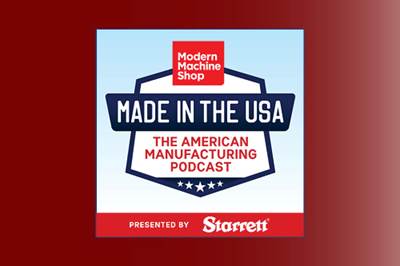Addressing the Manufacturing Labor Shortage Needs to Start Here
Student-run businesses focused on technical training for the trades are taking root across the U.S. Can we — should we — leverage their regional successes into a nationwide platform?
Share



When Mr. Cegielski’s sixth-grade class holds a business meeting with a potential customer, the children are to follow three fundamental rules about how to drink a soda during the meeting. Rule 1: No shoving or tackling those in front of you to get your soda first. Rule 2: Open your soda before the meeting starts. No one wants to hear the slow crack of your soda can while people are trying to talk. Rule 3: During the meeting, place your soft drink in front of you on the table, not in your lap or on the floor or in your hand. Rule 3b: Resist the urge to crinkle or crush your can during the meeting, no matter how satisfying it may be.
Mr. Cegielski is a middle and high school technical education instructor and the founder of Cardinal Manufacturing, a student-run business in Strum, Wisconsin. This magazine has covered Cardinal Manufacturing several times over the program’s 16-year existence, and its focus on teaching both soft skills and technical training from an early age has been hugely successful.
Cardinal’s custom job shop within Eleva-Strum Central High School is a clean, bright, open space loaded with machines and equipment for everything from welding to CNC machining to design and woodworking. Besides Cegielski, fellow instructor Tyson Rohrsheib and program coordinator Rachel Odegard, the business is run by less than two dozen high school seniors — students who have taken the required prerequisite classes (including Metalworking I and II) and who devote two class periods each day to performing real work for real customers.
I talked to Cegielski recently about how these seniors prepare for their jobs and was interested to hear that the prep work begins early. How to initiate a conversation, how to shake hands, how to communicate with peers and clients, how to arrive on time — and yes, how to drink a can of soda during a meeting — these lessons in soft skills begin in sixth grade, at the earliest middle-school level. Such lessons are key not only to the students’ success at Cardinal Manufacturing when they become high school seniors, but also vital to employers in the region. In fact, Cegielski has heard time and again from local employers who weigh mastery of soft skills as much or more than mastery of technical skills when making hiring decisions.
To machine shops, job shops and OEMs in a metalworking industry doing its best to automate its way through a skilled labor shortage, Cardinal Manufacturing feels like an oasis. When I talked recently with Roger Atkins, president of the National Tooling & Machining Association (NTMA), he was aware and appreciative of Cardinal’s work and the model of manufacturing education and training the school provides. But programs like Cardinal Manufacturing have a big problem, Atkins says: There are simply not enough of them. And there are seemingly no efforts by federal or state governments to network or integrate the programs that do exist into a national platform that can receive federal or state funds. Politics is part of the issue.
“We were just in Washington the other day. We flew in about 12 of us and met with members of Congress and senators and staff members,” Atkins says. “And of course, the number one thing we're bringing up is manufacturing workforce development. Are they aware of it? Yes, they're keenly aware of it. Do they know what to do? I'm not sure they know what to do.” The reality, Atkins told me, is that almost nobody on Capitol Hill wants the opposing party to be a winner in D.C.
Atkins says he encounters this attitude when he meets with politicians on both sides of the aisle — even those who espouse a pro-manufacturing agenda. Is it naïve to assume that the creation of a federal education program for technical training and the trades that begins in middle school — a program like Germany’s dual-track vocational training program (which, to be clear, faces its own challenges) — would be a triumph for both sides of the political spectrum?
These are great programs, Atkins says, and there are perhaps dozens of them spread out throughout the country. (Shoutout to Eagle Manufacturing in Nashville, Indiana.) The problem is that they are currently unnetworked. Similarly, all 50 states have federally funded Manufacturing Extension Partnership (MEP) centers that exist to strengthen and empower U.S. manufacturers. But there can be a frustrating lack of alignment between the regional partner organizations that some MEPs manage. Facing this, how can we leverage the success of programs like Cardinal Manufacturing that are taking root across the U.S.? I welcome your thoughts. Email me at bdonaldson@mmsonline.com.
Related Content
How I Made It: Amy Skrzypczak, CNC Machinist, Westminster Tool
At just 28 years old, Amy Skrzypczak is already logging her ninth year as a CNC machinist. While during high school Skrzypczak may not have guessed that she’d soon be running an electrical discharge machining (EDM) department, after attending her local community college she found a home among the “misfits” at Westminster Tool. Today, she oversees the company’s wire EDM operations and feels grateful to have avoided more well-worn career paths.
Read MoreInside Machineosaurus: Unique Job Shop with Dinosaur-Named CNC Machines, Four-Day Workweek & High-Precision Machining
Take a tour of Machineosaurus, a Massachusetts machine shop where every CNC machine is named after a dinosaur!
Read MoreHow I Made It: Montez King
From high schooler pushing a broom on a shop floor to executive director of the National Institute of Metalworking Standards (NIMS), a series of bold decisions have shaped Montez King’s career path.
Read MoreShop Tour Video: You've Never Seen a Manufacturing Facility Like This
Explore Marathon Precision’s multi-process approach to manufacturing, where blacksmiths and hand-forged dies meet state-of-the-art CNC machining. Discover how restoring classic muscle cars and building custom art projects creates a dynamic shop culture — and draws top talent to this unique and innovative metalworking facility.
Read MoreRead Next
There's Your Waste, Shaw! An Argument for Shop Reinvestment
The fictional Don Walling had it right: Innovation and long-term success for machine shops requires investments in technology and people. Not just one, but both.
Read MoreAn American Manufacturing Story
For manufacturers that choose to move or keep production in the United States, what are the challenges and opportunities that motivate them?
Read More



























